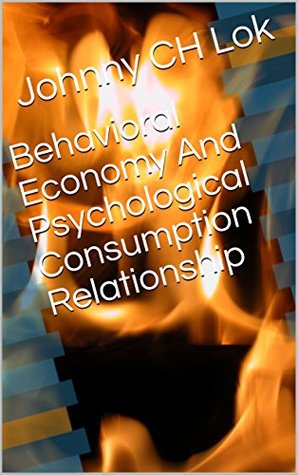Read Behavioral Economy And Psychological Consumption Relationship - Johnny C.H. Lok file in PDF
Related searches:
4531 238 157 2647 4903 1597 617 4689 3148 4865 4348 4580 1820 3385 1383 4906 3441 2840 2959 2786 162 819 4959 1471 3744 3560 4324 4750 2824 2031 1388 2419 4507 3435 245
Read more on behavioral economics or related topic psychology francesca gino is a behavioral scientist and the tandon family professor of business administration at harvard business school.
Behavioral economics is the study of how psychological, social, and emotional factors often conflict with and override economic incentives when people make.
Psychology and behavioral economics offers an expert introduction to how psychology can be applied to a range of public policy areas. It examines the impact of psychological research for public policy making in economic, financial and consumer sectors, in education, healthcare and at workplace, for energy and the environment, and in communications.
Increasingly, the civic, nonprofit, corporate social responsibility and social impact sectors at large are using behavioral economics and psychology to launch better.
An introduction to behavioral economics: using psychology to explain economic behavior.
Behavioral economy and psychological consumption relationship [lok, johnny ch] on amazon. Behavioral economy and psychological consumption relationship.
Modern behavioral economists have taken this further by bringing together rich insights from psychology to capture how economic incentives and motivations.
The standard economic framework ignores or rules out virtually all the behavior studied by cognitive and social psychologists.
This masterclass reveals exactly how to use insights from 4 decades of research in consumer psychology and behavioral economics to increase conversions. You’ll get a step-by-step framework on how to apply 24 most powerful psychological principles into your ads, landing pages, emails, sales funnels and everything in between.
The behavioral-economics alternative adds limits to computational ability, willpower and selfishness to the historical optimization approach. Knowledge of these limits comes from psychology and, more recently, neuroscience. In this general behavioral view, prices, income and information certainly affect behavior.
Such assumptions are not only psychological in nature, but also biological, sociological, and institutional.
Called behavioral economics but also going by the names behavioral finance, behavioral decision making or simply psychology. Indeed, the importance of this new field is evidenced by nobel prizes being awarded to prominent behavioral economists daniel kahneman in 2002 and richard thaler in 2017.
We argue that mental health economics is like health economics only more so: uncertainty and variation in treatments are greater; the assumption of patient self-interested behavior is more dubious; response to financial incentives such as insurance is exacerbated; the social consequences and external costs of illness are more formidable.
The field of behavioral economics blends ideas from psychology and economics, and it can provide valuable insight that individuals are not behaving in their own best interests.
We then review the recent literature on the psychology of poverty, including the effects of scarcity on cognitive function and economic behaviors, the potential role.
Behavioral economics an interdisciplinary field concerned with understanding how heuristics, biases, and other psychological variables influence economic.
Com, behavioral economics studies, “ cognitive, social and emotional influences on people's observable.
Econ essentials' new 4-part behavioral economics digital lesson series explores how psychology relates to economic decision-making.
Behavioral economics is a study that intersects the teachings of psychology and economics. More specifically, as stated by investopedia� behavioral economics “relates to the economic decision-making processes of individuals and institutions.
Behavioral economics studies the effects of psychological, cognitive, emotional, cultural and social factors on the decisions of individuals and institutions and how those decisions vary from those implied by classical economic theory. Behavioral economics is primarily concerned with the bounds of rationality of economic agents.
Behavioural economics is a rather recent field of mainstream economics; furthermore, findings from neighbouring disciplines (psychology, social sciences�.
With the continuous development of china's economy, efforts of economic system psychological, behavioral, and economic perspectives on corruption.
Behavioral economics (also, behavioural economics) studies the effects of psychological, cognitive, emotional, cultural and social factors on the decisions of individuals and institutions and how those decisions vary from those implied by classical economic theory.
Results 1 - 15 of 46 behavioural economics applies psychological insights into human behaviour to explain how real people make economic decisions.
“behavioral economics” improves the realism of the psychological assumptions underlying economic theory, promising to reunify psychology and economics in the process. Reunification should lead to better predictions about economic behavior and better policy prescriptions.
Kahneman won the 2002 nobel prize in economics for for having integrated insights from psychological research into economic science, especially concerning.
Behavioral economicsuses an understanding of human psychology to account for why people deviate from rational action when they’re making decisions.
Behavioral economics is the study of the emotional and psychological influences on decision making. It is the study of the theories behind why people make certain economic decisions, particularly those decisions that may be contrary to their best interest.
With behaviorism; in fact the historical roots of behavioral economics can be reading the classical economists' philosophical and economic psychology,.
Nov 1, 2019 in behavioral economics (be), there is no conceptual model that connects cognition and its proposed applications.
He is considered the father of behavioral economics — a relatively new field that combines insights from psychology, judgment, and decision making, and economics to generate a more accurate.
Behavioral economics is the study of psychology as it relates to the economic decision-making processes of individuals and institutions.
Jun 24, 2011 gary belsky and thomas gilovich reveal the psychological forces -- the patterns of thinking and decision making -- behind seemingly irrational.
Behavioral economics improves the realism of the psychological assumptions underlying economic theory, promising to reunify psychology and economics in the process. Reunification should lead to better predictions about economic behavior and better policy prescriptions.

Post Your Comments: